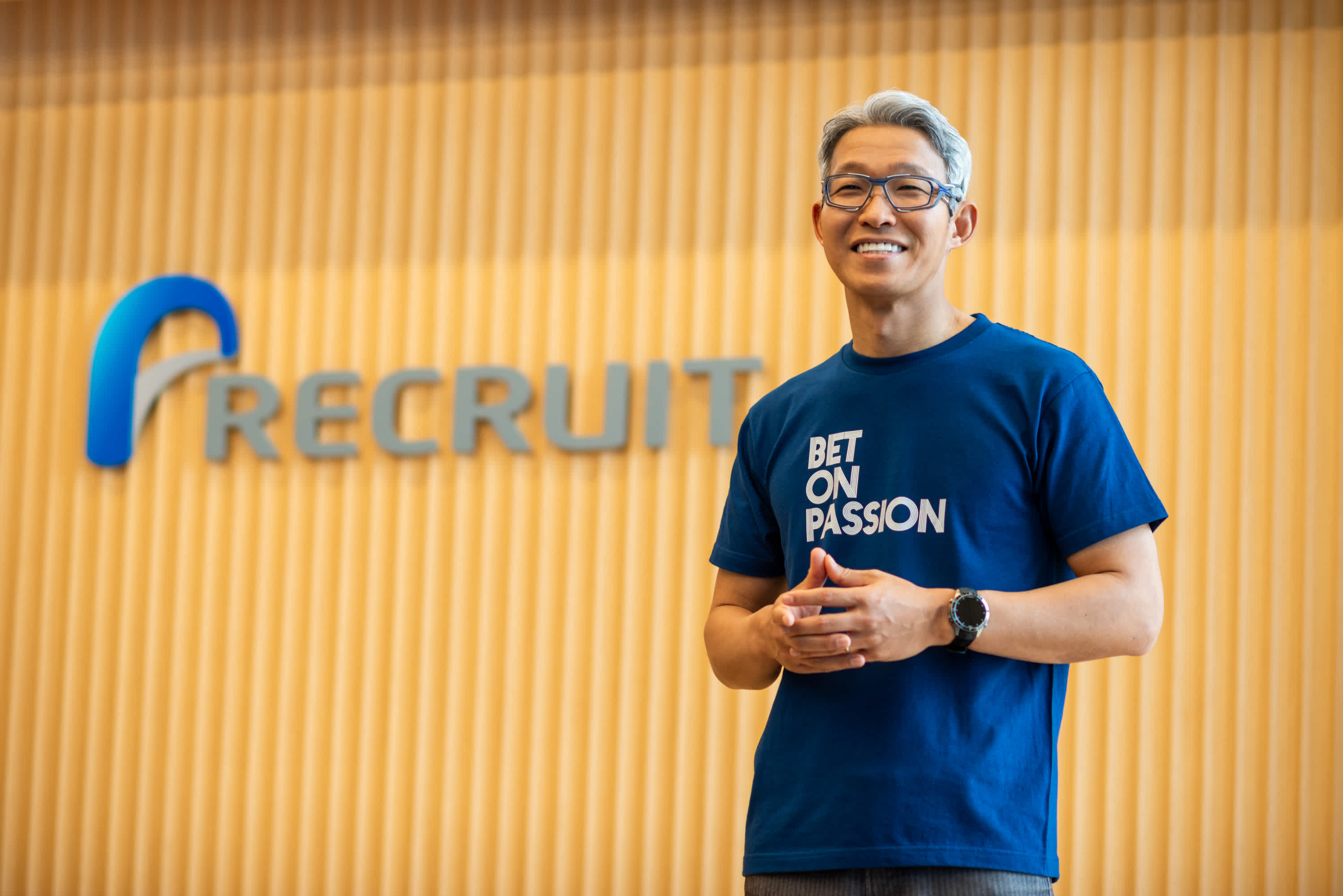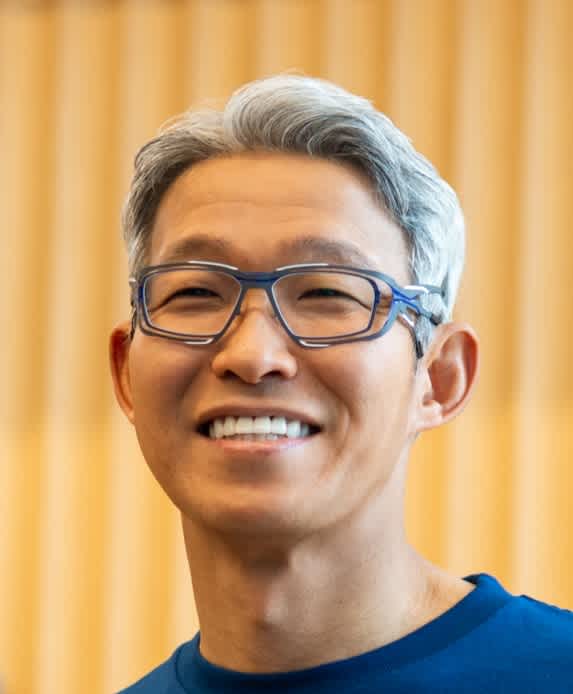We spoke to Recruit Holdings President and CEO Hisayuki “Deko” Idekoba about his leadership style and what he values in management.
My Leadership Style Is to “Bet on Passion”
As I’ve often said, I want to be the CEO with the least authority and power in the world. When you hear the word leadership, you might think of a dominant boss who loudly declares “I am your leader” and forges ahead, giving detailed instructions and driving the team forward.
In fact, in the US — where I’m now based – I think a strong leadership style is the norm. That is not my style, however. Especially when I first came to the US as the CEO of Indeed, I couldn’t speak English at all. I tried my best, but even when I put on a brave front and said “I’m going to do it like this” in halting English, it was impossible to do so with any dignity.
I happen to work for a large company, and I also happen to be good at creating, scaling and growing businesses, so I happen to be the CEO. There are plenty of things I can’t do on my own, though, and there are many people who can achieve far better results than me in other fields, such as sales and human resources. As the saying goes, “A little knowledge is a dangerous thing.” It’s better to ask someone who is good at something to do it right from the start rather than pretending to be able to do something you can’t.
That’s why, in both Japan and the US, I’ve always said: “I’m delegating authority to you, so I’d like you to make the decision.”
Actually, the businesses I’ve been in charge of in Japan have all been in a corner. With businesses that are shaky, it’s easy to see what needs to be done, and you can focus on one thing: making the business grow. For example, in soccer, if you’re losing 0-1 with 10 minutes left, you’ll naturally pass the ball to the player who’s most likely to score, even if no one gives any instructions to that effect.
What is the purpose of an organization or team? What’s the current situation, and what are we trying to do? What will happen after the goal has been achieved? If these things are shared clearly, then each person will do what they can without the leader having to give detailed instructions or manage them. I have experienced this for myself.
One of Recruit Group’s stated values is “Bet on Passion.” We believe we achieve the best results when people are doing what they love because that’s when we bring out the best in people. When I took over as CEO after Recruit acquired Indeed, the first thing I told our employees was that they didn’t need to work for Recruit; they should continue to focus on achieving Indeed’s mission.
In particular, when it comes to innovation, the people closer to the frontline have a deeper understanding of the rules and the situation, and they are the ones passionate about the work. I try to interfere as little as possible, since I know we can create a better product if they are the ones making the decisions. If I start thinking “I’m absolutely right, so everyone should follow me,” that would be very dangerous. As long as I’m making decisions while hesitating and making mistakes every day, I think we’ll be okay. And as long as I can keep moving things forward while saying “We won’t know until we try, but let’s give it a go,” I believe we’ll be able to make it through somehow.

Hisayuki “Deko” Idekoba, President, CEO, and Representative Director of Recruit Holdings Co., Ltd.
The Only Way to Create New Value Is through the Cycle of Try, Fail, Learn and Grow
Another of Recruit’s values is “Wow the World.” We’re trying to create new business models. That is impossible, though, in a situation in which you can’t afford to lose. If we don’t boldly take on challenges, learn from our mistakes and continue to grow, we’ll end up doing business the same way as before.
If we can continue to win by doing business the same way as before and refining our winning patterns, of course, there’s no problem. In the Internet business we are in, however, game-changing events occur frequently. New business models are constantly being created and quickly reshaped, so even if you refine your business based on a certain model, there’s no guarantee you will win. To continuously create new value in such an environment, you have no choice but to repeat the cycle of trying, failing, learning and growing.
Under these circumstances, I think a leader’s role is not to prevent failure but to control the way in which failure occurs, and regulate the overall impact of failures.
For example, when you’re teaching a child how to ride a bike, no matter how carefully you explain how to pedal, they won’t be able to do it. They need to actually try it, fall over, think about why they fell over, and then try again.
That said, I think there’s a big difference in where you let them have this experience. If they fall over in a big park, for instance, they might get lots of scrapes, but if you treat them properly, they’ll soon be fine. However, if they fall next to a busy road, they could suffer a serious and even life-threatening injury. In business, both individuals and teams need to make mistakes to grow, but team leaders and those above them need to regulate the overall impact of failures to avoid situations they cannot control.
I’m the type of person who always plans for the worst, so when I start something new on my own or try something new as part of a team, I think very carefully about what to do if it fails. I often use the phrase “Plan B, Plan C,” and it’s not an exaggeration to say that I’m usually thinking about dealing with failure.
There’s no need for team members to be that pessimistic, though. Once you’ve decided to do something, I want you to pursue it with all your heart. It’s the leader’s role to think about what to do if you fail. As the Art of War teaches, reckless desperation should be avoided at all costs. If you show desperate resolve and end up getting killed, you can’t say you’ve fulfilled your role. It’s not cool to be a leader who says, “I never thought it would turn out like this.”

Note to Future Leaders: Be More Selfish and Face Work That You Can Pour Your Passion Into
When I talk about things like this, I often get asked, “Even if you know for sure that it’s going to fail, do you still let people try?”
Yes. Sometimes even when I think the chances of success are low based on my own experiences. If there is passion there, I think it’s better to let people fail than to stop them from trying.
In the first place, there is little to be gained from understanding other people’s experiences intellectually. If you watch a video of someone snowboarding and figure you’d like to try it, you might feel like you could do so easily, and yet it’s impossible to learn such complex movements and balance just by watching a video. When it comes to sports, everyone knows that you can’t reproduce something without actually moving your body yourself.
When it comes to business, though, it’s strange that so many people feel they can do the same thing simply by reading books by successful people, listening to lectures, or watching videos. It’s impossible to reproduce someone else’s successful methods exactly, and even if you could, it’s extremely rare that they would work in your own company. Even if I have proof that something will fail, and I explain why to my team members and they agree and stop doing it, what’s the value in that? It would be more valuable to manage the situation so that the worst-case scenario doesn’t happen when you fail, and to grow through the experience of failing.
However, there is one thing I ask of my team members: Please don’t surprise me. For example, let’s say we set a sales target of 100 billion yen for the year, but then along the way you realize you can never achieve it. Then at the end of the year, without any prior report or consultation, you tell me, “Actually, we won’t even reach 10 billion yen.” I would be surprised, and I think the board of directors would also be surprised when I report this.
If the problem is not shared before it becomes serious, the solutions will be limited. If you talk about it as soon as it becomes apparent, though, we can consider various solutions together.
I know this well because I’ve made many mistakes and faced many problems myself. I know that no one sets out to make mistakes. The tougher the challenge, the harder it is to anticipate the risks in advance, and a lot of things can and will go wrong.
In such cases it’s better to be honest, and I believe it’s wise to not surprise people when building long-term relationships of trust. I tell our management teams around the globe that “I don’t want to check or approve things in advance. I want you to make your own decisions. However, if something goes wrong, I want you to tell me about it.” They understand and say, “That’s simple.”
We were not born to work for Recruit Group or any companies. In fact, I initially planned to leave after three years, treating it as business training. However, the reason I’m still here is because this company has built up tremendous assets over the years — especially in terms of human resources, clients, and users. This environment has allowed me to keep pursuing my passion: creating value with a significant social impact.
Similarly, if you try various things at this company, make mistakes, and find things you can’t do here, you have the option of quitting the company. I think it’s great that more and more people are going out into the world and creating new value.
Recruit has its own unique mission management system called “Will-Can-Must.” If you don’t connect the elements “what you want to do,” “what you can do” and “what you should do,” and only rely on the opinions of those around you, you’ll find it harder and harder to enjoy life, especially as you get older. Especially in a business environment where change is rapid and there are no clear answers to the question of what is right, all you can do is what you believe is best for the individual, the organization and society. I believe that future leaders will be required to find a job they can pour their passion into and continue to face up to it. I also think it’s okay for everyone to live more selfishly, and that my role is to create an environment in which each person can find a job that they can pour their passion into.

Hisayuki “Deko” Idekoba
President, CEO, and Representative Director of Recruit Holdings Co., Ltd.
Over the course of two decades, Deko has led the digital transformation of numerous Recruit Group businesses. He was responsible for transitioning print publications and marketing sectors into online businesses across various sectors including travel, beauty, and dining. Being appointed Senior Vice President in 2012, he led the acquisition of Indeed and later served as Indeed's CEO, helping Recruit Holdings become the leading global HR technology company it is today.